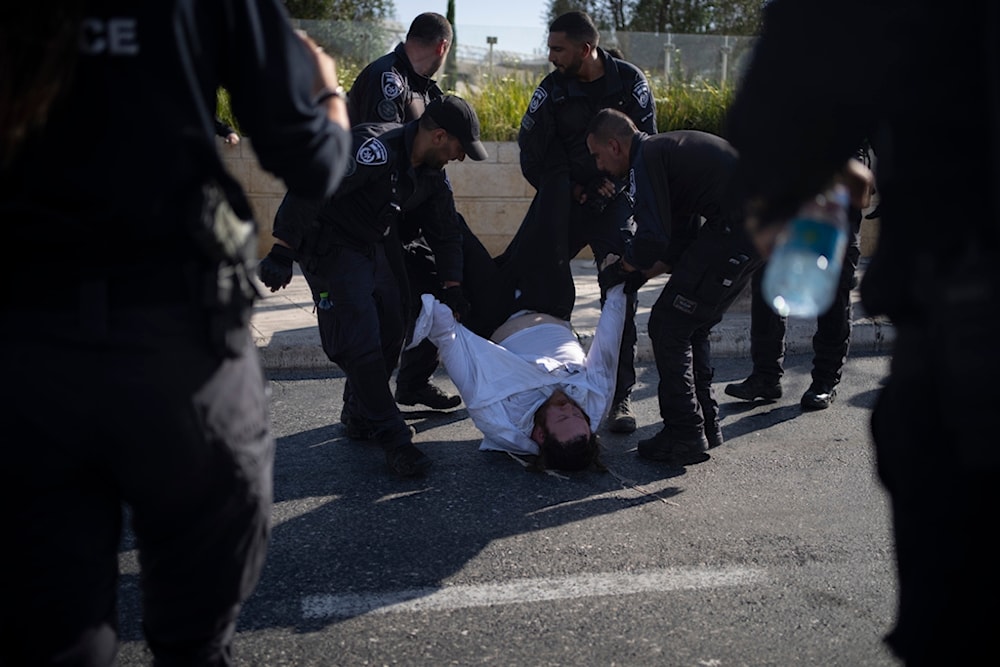Israeli High Court unanimously votes for military draft of Haredim
The Israeli High Court of Justice's nine-judge panel has expressed its discontent with the Haredim's request for exemption from war, voting for mandatory conscription.
-

Israeli police officers remove an ultra-Orthodox Jewish man from the street during a protest against army recruitment in Jerusalem on June 2, 2024. (AP)
The Israeli High Court of Justice's nine-judge panel unanimously voted on Tuesday for the conscription of Haredi Jews into the military, and the halt of all subsidies and funds allocated for institutions that do not comply with the ruling, according to the Jerusalem Post.
As the Haredim have been relentlessly protesting against the occupation government's decision to impose a mandatory draft into the military on the community, a drastic change in the political atmosphere in "Israel" could be anticipated, even leading to new elections.
The Supreme Court's decision will be immediately applied, unlike a precedent made in April, which endured delays for fund freezing until August 8.
Several previous votes occurred amid a heated public and legal discourse surrounding the issue of blanket exemptions for ultra-Orthodox individuals from military conscription. Concurrently, the High Court of Justice had been reviewing numerous petitions urging the immediate drafting of young Haredi men.
For decades, ultra-Orthodox men of military age have avoided Israeli army conscription by enrolling in yeshivas for Torah study and obtaining repeated one-year service deferrals until reaching the age of exemption. In 2017, the High Court ruled such mass exemptions illegal and discriminatory. Subsequent occupation governments have attempted without success to devise new legislation to address the issue while seeking repeated deferrals from the court.
No empathy in court
What was most noteworthy, according to JP, was the blatant criticism that three of the most conservative judges on the panel, Noam Sohlberg, Alex Stein, and Yael Wilner, directed at the occupation government.
Sohlberg appeared to be "furious" that only 3,000 Haredi Jews were chosen to be drafted out of over 60,000 eligible draftees, particularly after the government rejected the number.
Meanwhile, Stein and Wilner strongly criticized the government's legal argument that mid-level IOF officers could broadly exempt haredim from military service, extending beyond cases of extreme individual extenuating circumstances.
In a few moments, the justices appeared to be criticizing the entitlement the Haredim felt while asking to be exempt from military service or calling mandatory conscription "oppression" at a time when the occupation faces a multifront war, particularly against the Palestinian Resistance in Gaza.
During the hearing, when a Haredi man declared that the ultra-Orthodox he knew would rather die than be drafted, the statement seemed less impactful to the justices amid the ongoing war than it might have in the past, The Jerusalem Post wrote.
Previously, such declarations shocked many Israelis who served in the IOF, leading them to react with disbelief and ultimately decide it was too challenging to negotiate with such a resolute group. However, the war appeared to have altered the atmosphere in the court.
Chief Judge Uzi Vogelman remarked to the government's lawyer that in attempting to sound logical, he had essentially echoed the arguments of both Attorney General Gali Baharav-Miara and the NGOs advocating for drafting Haredim.
The court's direction seemed clear, with the only question being the extent of its actions.
MKs ditch the funds
In late March, the court froze one-third of certain government funds for approximately 1,750 Haredi Yeshivot (seminaries). This decision affected only a portion of the latest draft class and did not impact the majority of the over 60,000 haredim eligible for IOF or national service, nor did it affect significant non-government funds raised by Haredi institutions.
Despite Haredi advocates framing the reduction in funds as a critical issue, their Knesset representatives have shown no evident effort to negotiate a new compromise, either within the government or during recent Knesset hearings, which began last week without any significant progress.
Haredi political parties seemed to have anticipated that most of their government funding wouldn't be affected before August or the recent court ruling.
They also understood that they could potentially maintain the current situation by triggering new elections.

 4 Min Read
4 Min Read








